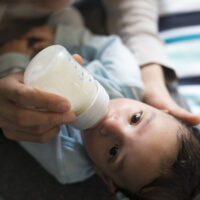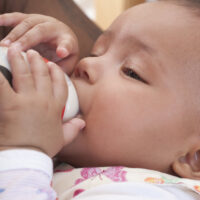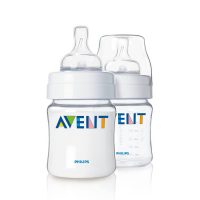Children often get sick from other kids’ germs, especially lingering school or daycare bacteria and viruses. There is, however, something that can help their bodies to fight these illnesses while also improving gut health. Probiotic supplements are like an “army that boosts the immune system.” Everyone has some amount of good and bad bacteria in their digestive tract. When the amount of good bacteria is higher, it keeps the gut microbiome in balance. Probiotics may play a role in preventing chronic diseases such as inflammatory bowel disorders, type 2 diabetes, and some cancers (source). Recent research shows that taking a probiotic may reduce the severity of allergies and eczema (source). Here are the best probiotics to help keep your kiddo healthy.
Best Probiotics for Kids
The Renew Life probiotics are in gummy form whereas the Now Foods, Intelligent Labs, and Naturo Sciences are chewables. The Culturelle and Lovebug probiotics are available in a chewable and powder form. Finally, Mary Ruth’s probiotics are liquid drops. Among these products, the Lovebug probiotics are the only versions with a USDA Organic label.
MaryRuth Organics Probiotics
MaryRuth’s Organics Probiotics are probiotic drops. The company offers a liquid version to provide the highest potency. It comes in a 4-ounce light-proof glass bottle to protect it from the sun and lights, and includes a dropper to make dosing easy.
MaryRuth Organic Probiotics are free of “creepy” ingredients, and are certified organic. The product contains no gluten, wheat, corn, GMOs, or nuts. It is also kosher, vegan, and keto or paleo-friendly. Both kids and their parents can take this probiotic. Add just a few drops to your kid’s beverage, and send them on their way!
These probiotic supplements are sourced from a blend of three organic grasses. Another cool aspect is they were not exposed to heat to maintain full potency. No refrigeration is necessary, although I would still recommend it for added protection. It includes 12 probiotic strains with 10 million active cultures in a flavorless liquid. This product is loved by hundreds of customers, adults and kids alike.
Active Ingredients
Lactobacillus-Acidophilus, L-Rhamnosus, L-Salivarius, L-Casei, L-Plantarum, Lactococcus-Lactis, Streptococcus-Thermophilus, Bifidobacterium-Bifidum, B-Lactis, B-Infantis, B-Breve, and B-Longumwater, 3 organic kinds of grass.
Issues
This is by far the most expensive option, most likely because of the no-heat treatment process. Some reviewers did not notice any reduction in their child’s illnesses, although an overwhelming amount of customers loved the product.
Another great organic probiotic for kids is the Garden of Life Dr. Formulated Probiotics Organic Kids+.
Naturo Sciences Children’s Chewable Probiotics
The Naturo Sciences Children’s Chewable Probiotics offer healthy bacteria without sugar. In addition, this supplement features some all-natural prebiotics to support the healthy bacteria in your child’s digestive tract.
With 5 billion probiotic bacterial colonies from eight potent strains, you can be that sure your child’s belly will be protected. Also, this tangerine-flavored, kid-friendly product is easy to take: just one chewable capsule daily with food.
One of the primary “inactive” ingredients is xylitol, an all-natural sweetener. With no other sweeteners, including artificial ones, your child’s teeth will stay in great shape too. This product is also vegan, free of nuts, and manufactured per cGMP guidelines.
Many parents claimed that this kid’s probiotic supplement helped to regulate their children’s bowel movements. A large number of customers loved the taste and added protection against unhealthy bacteria.
Active Ingredients
Lactobacillus acidophilus LA-14, Bifidobacterium lactis BI-04, Lactobacillus plantarum LP-115, Lactobacillus salivarius LS-33, Lactobacillus paracasei LPC-37, Lactobacillus rhamnosus GG, Lactobacillus casei LC-11, Bifidobacterium long BI-05, Larch tree fiber, chicory inulin.
Issues
According to the reviews, not every child will love the taste. The pill may also stain clothing, so make sure your child chews and swallows the tablet completely.
Intelligent Labs Probiotics Children
If tangerine isn’t your child’s favorite flavor, try Intelligent Labs Probiotics for Children instead. This powdered probiotic comes in a festive “mixed wild berry” flavor that is sure to appeal to the majority of children. It also features 6 billion CFU of probiotic per tablet.
With sixty chewable tablets, the bottle contains a two-month supply of this supplement. This probiotic is made without animal products, sugar, gluten, or GMO’s. Like the previously mentioned product, xylitol is used as a natural sweetener. Xylitol is ideal because it inhibits the ability of oral bacteria to grow and cause cavities.
This brand includes the prebiotic fructooligosaccharides (FOS) to further improve your child’s gut and digestive health. Probiotics consume prebiotics in order to thrive and work harder in your child’s tummy.
Lastly, the bottle was uniquely designed to maintain the viability of the product. A moisture absorbing sachet is added to each bottle to prevent spoilage. Intelligent Labs Probiotics are made in the USA at an FDA registered facility. They are quality tested by a third party company. This product is for kids aged two and older.
Active Ingredients
B. Lactis, L. acidophilus, xylitol, Fructooligosaccharides, guar fiber.
Issues
As with many things, whether or not your child will enjoy the wild berry flavor is based on taste preferences. Some reviewers mentioned this as an issue. Annoyingly, the company may also email you several times to request a good review.
Now Foods BerryDophilus 60 Chewables
Now Foods brand offers hundreds of supplements, all without unnecessary or harmful ingredients. One of their lesser known products is their Now Foods BerryDophilus 60 Chewables. With ten strains of healthy bacteria, this kids probiotic supplement is effective despite the lower CFU.
These chewable tablets have a fun berry flavor, and a two-month supply in each bottle. This Now Foods product is vegan, kosher, halal, and free of nuts, gluten, dairy, and soy. It’s even Keto if mommy would like to take it too!
This product features prebiotics in the form of FOS. With xylitol, it also benefits works teeth. It has all of this with a wonderful taste.
Active Ingredients
Lactobacillus acidophilus (La-14), Bifidobacterium lactis (Bl-04), Lactobacillus plantarum (Lp-115), Lactobacillus casei (Lc-11), Lactobacillus rhamnosus (Lr-32), Lactobacillus paracasei (Lpc-37), Bifidobacterium breve (Bb-03), Streptococcus thermophilus (St-21), Lactobacillus salivarius (Ls-33), Bifidobacterium longum (BI-05), xylitol, (FOS) Fructooligosaccharides as a prebiotic.
Issues
The flavor is not agreeable to all children, and some disliked the texture.
Lovebug Tiny Tummies Probiotics
The Lovebug Tiny Tummies Probiotics are little flavorless packets that can be added to cold foods or drinks. That’s right moms. Mix this up in a sippy cup, and it’s ready to go with no fuss, mess, pills to chew, or anything else.
Other benefits are that this probiotic powder is sugar-free, and has 1 gram of fiber. Each packet contains 15 billion CFU of healthy bacteria to help your child’s digestive tract. It too has prebiotics in the form of FOS. It is also free of GMOs, gluten, sugar, nuts, and soy.
Lovebug Tiny Tummies is produced by a woman-owned company in New York whose goal is to improve the lives of babies and children. It provides eight different probiotic types, including a super-strain” of bacteria designed just for kids.
In addition, the individual-sized packets make it easy to take this probiotic supplement on the road. Like other probiotics, it is best to store it in the fridge for optimal health of the product. Although the manufacturer states that refrigeration is not necessary, a little extra protection cannot hurt.
Active Ingredients
B. infantis, B. lactis, L. rhamnosus GG, L. plantarum, B. longum, L. casei, L. paracasei, L. gasseri, Chicory, and Fructooligosaccharides (FOS).
Issues
Some parents reported that their kids developed tummy aches after taking it. This may be normal, however, especially with such a high number of bacterial strains. If the problem doesn’t resolve after a week or two, I would advise you to switch to a brand like Now Foods with less bacterial CFU per dose. However, an initial adjustment period is normal and expected when starting something new. Once your little one’s body gets used to the new supplement, their immune system will benefit, and their digestive tract may tolerate it better.
Check out the best infant probiotics to start your baby off on the right track.
Culturelle Kids Daily Probiotic Packets
Instead of trying a product with multiple probiotic strains, you may want to choose one with a single bacterial strain. Culturelle Kids Daily Probiotic Packets only has just Lactobacillus GG, also known as Lactobacillus rhamnosus GG or LGG. The benefits of this probiotic have been proven and well-documented (source).
This bacterium forms a protective coating onto the lining of the intestines, and provides relief from tummy troubles such as gas and diarrhea. It also promotes immune functions in the surrounding intestinal lymph nodes.
This tasteless powder mixes well into any cool drink or food. Mix it in yogurt or applesauce, and your kids will never know it’s there!
There is no gluten, lactose, milk, added colors, preservatives, yeast, or soy in this probiotic powder.
To improve the taste, there is sucrose and mannitol, a type of sugar alcohol. It helps give the powder a little sweetness, and the right texture.
Culturelle Kids is more budget-friendly than most options on this list.
Active Ingredients
Lactobacillus GG and inulin.
Inactive Ingredients
This product contains some chemical additives: silicon dioxide, sucrose, maltodextrin, and sodium ascorbate.
Issues
Some parents may balk at the ingredient list. I’ll admit it’s not the cleanest ingredient list I’ve ever seen (I’m looking at you, sucrose!). However, it tastes good (like nothing), and mixes well.
For older children, there is a berry-flavored Culturelle Kids Chewable Probiotic.
Renew Life Kids Probiotic Gummies
I have included this option as a last resort. If the only way you can get your child to take a probiotic is in the form of a sugary-sweet gummy, then Renew Life Kids Probiotic Gummies is a fabulous choice. There are 3 billion live cultures in every serving, and it comes in a variety of fruit flavors (i.e. orange, pineapple, strawberry).
These gummies get their fruity flavor from natural fruit juices with a bit of added sugar. There are no artificial flavors or colors added to this product. It’s also free of dairy and soy, a plus for those with such allergies. However, it does contain wheat. Now, I know that wheat and sugar are not ideal, but Renew Life Kids may help if you want to sneak some probiotic supplements to a super-picky eater.
The cultures come from bacillus coagulans, one of the most highly-studied and scientifically backed probiotic strains available. This bacterium can reduce a child’s digestive issues such as stomach upset or constipation. It also provides an immunity boost, and is recommended for kids over age 3.
This affordable product is totally shelf-stable, so you can store it in the pantry. However, it may be best to keep it in the fridge as a precaution.
Active and Other Ingredients
Bacillus coagulans, sugar, glucose, deionized pineapple juice, wheat starch, gelatin, colors (turmeric oleoresin, annatto extract, and radish), invert sugar, sodium citrate, citric acid, natural flavors (pineapple, orange, and raspberry).
Issues
It contains lots of sugar which is less-than-desirable. Due to a possible risk of choking, it is not recommended for kids under age 3. If you have a 1 or 2-year-old who can handle other fruit snacks, they may be fine taking these with adult supervision.
Probiotics for Kids Compared
The table below compares only the recommended products on this page. A low or high Price means it is low or high compared to the other products listed. The Popularity Score reflects how often readers click on and buy the product. The Quality Score is our assessment of the overall performance and satisfaction with the product compared to others in the table.
| MaryRuth Organics Probiotics | 9.9 | 9.4 | 29.95 |
| Renew Life Kids Probiotic Gummies | 8.9 | 9.2 | 25.99 |
| Intelligent Labs Probiotics Children | 9.6 | 9.2 | 20.99 |
| Culturelle Kids Daily Probiotic Packets | 9.9 | 9.4 | 19.98 |
| Lovebug Tiny Tummies Probiotics | 9.9 | 9.4 | 18.68 |
| Now Foods BerryDophilus 60 Chewables | 3.9 | 9.6 | 16.95 |
| Naturo Sciences Children's Chewable Probiotics | - | 9.2 | - |
FAQs – Probiotics for Kids
Should I refrigerate probiotics for kids?
Yes. These are live cultures and refrigeration reduces the chance of ambient temperature changes affecting the potency of the product. Also, do not add probiotic supplements to heated liquids or foods like soups or warm milk.
Will probiotics help my child with diarrhea?
Yes. Probiotic supplements are good bacteria that keep the gut flora in a healthy balance. In the presence of an intestinal infection, probiotics may reduce how long the diarrhea lasts (source).
If your child is taking antibiotics, ask your pediatrician about giving probiotics if they are not already part of the daily routine. Antibiotics kill both bad and good bacteria. Taking probiotics will replenish the good bacteria, and reduce antibiotic’s intestinal side effects (source).
Can probiotics help other issues besides stomach troubles?
Yes. Probiotics promote digestive and immune health. This can reduce inflammatory bowel issues, ulcers, allergies, eczema, tooth decay, and the risk of colon cancer (source).
What are the main probiotic strands? Which one do I need?
The four main strains of probiotics and their benefits are:
- Lactobacillus acidophilus – can help with Crohn’s disease, diarrhea, constipation, allergies, and eczema.
- Bifidobacterium lactis – can prevent diarrhea and constipation, and NEC in premature infants.
- Saccharomyces boulardii – can improve overall digestion.
- Lactobacillus rhamnosus GG – helps prevent intestinal infections, and reduces colic symptoms in infants.
Should I give my child probiotics if they are sick?
Probiotic supplements can be helpful in reducing the symptoms caused by some illnesses and medications. Check with your doctor first before giving probiotics. Most probiotic yogurts, however, are fine to offer.
Does my child need probiotics every day?
Most probiotic supplements are intended to be taken daily, and can become a natural part of your child’s diet. If you prefer not to purchase supplements, food sources include yogurt, kimchi, kefir, tempeh, kombucha, miso, sauerkraut, or pickled cucumbers. However, many kids do not consume enough of these foods to obtain enough good bacteria to maintain a healthy balance in their digestive tract.
Your child may not need a probiotic every day, but definitely keep one at home in case of a “stomach bug” or other digestive problem. Giving it daily may not be practical for every parent, but these 7 best probiotics for kids are great options should you choose to do so.













